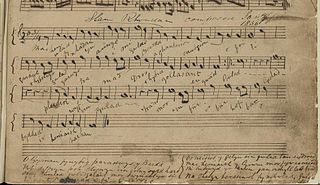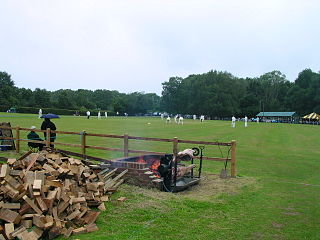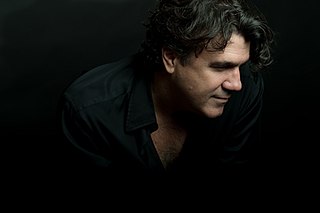
"Hen Wlad Fy Nhadau" is the unofficial national anthem of Wales. The title, taken from the first words of the song, means "Old Land of My Fathers" in Welsh, usually rendered in English as simply "Land of My Fathers". The words were written by Evan James and the tune composed by his son, James James, both residents of Pontypridd, Glamorgan, in January 1856. The earliest written copy survives and is part of the collections of the National Library of Wales.

Catatonia were an alternative rock band from Wales who gained popularity in the mid-to-late 1990s. The band formed in 1992 after Mark Roberts met Cerys Matthews and Kirsty Kennedy. The first major lineup featured Dafydd Ieuan of Super Furry Animals on drums, Paul Jones on bass, and Clancy Pegg on keyboards. With this line-up the band recorded two EPs, For Tinkerbell and Hooked.

Ebernoe Horn Fair is held in the small Sussex village of Ebernoe, the location of which is about five miles north of Petworth. The fair is held annually on Saint James's Day, 25 July. The tradition is centuries old though it appears to have been revived in 1864 after a long lapse. The celebration is held on the village common and the main attraction is a cricket match between Ebernoe and a nearby village. Towards the end of the day the highest scoring batsman is presented with a set of horns. These are taken from a sheep which has been roasted during the day. It is thought the presentation of horns is associated with the custom of dressing up with horns as a symbol of cuckoldry. Centuries ago horn fairs were boisterous events where cuckoldry and seduction would not be unknown. The practice of dressing up with horns is alluded to in the traditional Horn Fair Song. The old saying All's fair at Horn Fair probably originates from such events. In days gone by it seems that Ebernoe Fair was often beset by thunderstorms. However, the storms were taken as a good luck sign and farmers would look forward to a good harvest. The absence of a storm would suggest the crops would fail. Ebernoe Horn Fair was also the day on which gardeners were reminded to sow their spring cabbages.
"Men of Harlech" or "The March of the Men of Harlech" is a song and military march which is traditionally said to describe events during the seven-year siege of Harlech Castle between 1461 and 1468, when the castle was held by the Lancastrians against the Yorkists as part of the Wars of the Roses. Commanded by Constable Dafydd ap Ieuan, the garrison withstood the longest known siege in the history of the British Isles. The song has also been associated with the earlier, briefer siege of Harlech Castle about 1408, which pitted the forces of Owain Glyndŵr against the future Henry V of England.
Sheldon Talmy is an American record producer, songwriter and arranger, best known for his work in the UK in the 1960s with the Who, the Kinks and many others.

Craigenputtock is an estate in Scotland where Thomas Carlyle lived from 1828 to 1834. He wrote several of his early works there, including Sartor Resartus.
"Early One Morning" is an English folk song with lyrics first found in publications as far back as 1787. A broadside ballad sheet in the Bodleian Library, Oxford, dated between 1828 and 1829 has the title "The Lamenting Maid" and refers to the lover leaving to become a sailor.
"Mary from Dungloe" is an Irish song originally penned by a County Donegal stonemason Pádraig Mac Cumhaill in 1936, telling a tragic story of love and heartbreak. A modified version of the song was re-released by The Emmet Spiceland Ballad Group and reached number 1 in the Irish singles music chart on 24 February 1968. This success prompted the creation of the Mary From Dungloe International Festival, an Irish music festival held in Dungloe, in northwest Ireland. There exists two versions of the song, the original long version by Pádraig MacCumhaill and a shorter version by Colm O'Laughlin, the latter version is the most popular today.

Feste is a fictional character in William Shakespeare's comedy Twelfth Night. He is a fool attached to the household of the Countess Olivia. He has apparently been there for some time, as he was a "fool that the Lady Olivia's father took much delight in" (2.4). Although Olivia's father has died within the last year, it is possible that Feste approaches or has reached middle age, though he still has the wit to carry off good 'fooling' when he needs to, and the voice to sing lustily or mournfully as the occasion demands. He is referred to by name only once during the play, in answer to an inquiry by Orsino of who sang a song that he heard the previous evening. Curio responds "Feste, the jester, my lord; a fool that the lady Olivia's father took much delight in. He is about the house" (2.4). Throughout the rest of the play, he is addressed only as "Fool," while in the stage directions he is mentioned as "Clown."

William Sidney Gwynn Williams was a musician and composer, also lecturer, author, editor and broadcaster on the history of British and in particular Welsh music. He was prominent in the foundation of the International Eisteddfod at Llangollen, Wales in 1947 and become its first musical director.
"Skibbereen", also known as "Dear Old Skibbereen", "Farewell to Skibbereen", or "Revenge For Skibbereen", is an Irish folk song, in the form of a dialogue wherein a father tells his son about the Irish famine, being evicted from their home, and the need to flee as a result of the Young Irelander Rebellion of 1848.
Danny Vaughn, born Daniel Himler on July 18, 1961, is an American singer. Vaughn has performed with Waysted, Tyketto and Vaughn and now performs and releases under his own name. He was also a lead singer in the Ultimate Eagles.

Darrell Brown is an American songwriter, arranger, manager and record producer who has collaborated with recording artists and contributed music to the film and television industries. Brown maintains residences in both Los Angeles, United States (US), and Nashville, US.

That's the Way Love Goes is the thirty-eighth studio album by the American country music singer Merle Haggard backed by The Strangers, released in 1983.
The Pontarddulais Male Choir is a Welsh male voice choir from Pontarddulais near Swansea, Wales. It is the most successful choir in Wales and is internationally renowned having performed in many parts of Europe as well as Canada and the United States.
Siobhán Owen is a soprano and harpist from Adelaide, South Australia. Owen regularly performs at festivals, concerts and events around Australia and further abroad. She favours classical and Celtic/folk songs, but also sings pop and jazz on occasion.

Thomas Oliphant was a Scottish musician, artist and author whose works were well known in their day. He wrote the chorale for the wedding of the future King Edward VII and Queen Alexandra. Oliphant wrote the words to "Deck the Hall(s) with Boughs of Holly".









